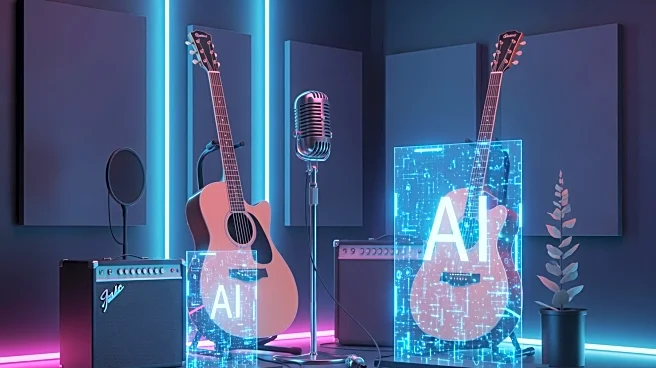What's Happening?
Austin, Texas, renowned as the live music capital of the world, is facing new challenges as musicians adapt to the rise of artificial intelligence (AI) in the music industry. The podcast Pause/Play, hosted
by Miles Bloxson and Elizabeth McQueen from KUT, explores how local musicians are navigating these changes. AI music generation platforms like Suno and Udio are transforming the industry, with Udio partnering with Universal Music Group to launch an AI music generation and streaming platform. This development raises concerns among musicians about the implications of AI on their creative processes and financial stability. Austin-based musician Zeale expresses a desire to understand AI's impact, acknowledging both its potential benefits and threats. The emergence of AI artists, such as The Velvet Sundown and Xania Monet, further complicates the landscape, as they gain popularity on platforms like Spotify and Billboard charts.
Why It's Important?
The integration of AI into the music industry poses significant challenges for musicians, particularly in terms of financial viability and creative control. Streaming platforms already offer minimal compensation to artists, and the rise of AI-generated music could exacerbate these issues. Musicians like Lauren Bruno are advocating for artist-centered streaming platforms that offer better pay and data control. The city of Austin is taking proactive measures by providing grants through The Live Music Fund, supporting musicians in their careers. This initiative is unique in the U.S. and could serve as a model for other cities. The situation highlights the broader implications of AI on creative industries, raising questions about the future of human artistry and the economic structures that support it.
What's Next?
Austin's approach to supporting musicians through grants may inspire other cities to adopt similar strategies. As AI continues to evolve, musicians and industry stakeholders will need to explore new business models and creative collaborations to ensure sustainability. The ongoing dialogue between artists, technology developers, and policymakers will be crucial in shaping the future of the music industry. Additionally, the development of alternative streaming platforms could offer musicians more equitable opportunities, potentially leading to a shift in how music is distributed and monetized.
Beyond the Headlines
The rise of AI in music raises ethical questions about the authenticity of art and the role of human creativity. As AI-generated music becomes more prevalent, society may need to reconsider the value placed on human versus machine-created art. This shift could influence cultural perceptions of music and challenge traditional notions of artistic expression. Furthermore, the economic impact on musicians could lead to broader discussions about fair compensation and the sustainability of creative professions in the digital age.











